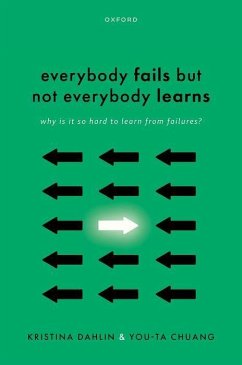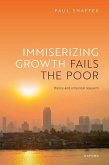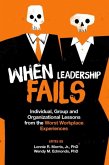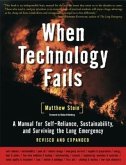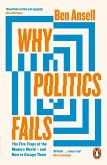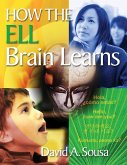Kristina Dahlin, You-Ta Chuang
Everybody Fails But Not Everybody Learns
Why Is It So Hard to Learn from Failures?
Kristina Dahlin, You-Ta Chuang
Everybody Fails But Not Everybody Learns
Why Is It So Hard to Learn from Failures?
- Gebundenes Buch
- Merkliste
- Auf die Merkliste
- Bewerten Bewerten
- Teilen
- Produkt teilen
- Produkterinnerung
- Produkterinnerung
Failure learning has emerged as a vibrant interdisciplinary area of research. This book brings 14 scholars together in an edited volume containing failure studies and highlighting learning issues in settings such as freight rail, nurses hand washing routines, operating theatres, aviation, computer programming, Formula 1 racing, and the US Marines.
Andere Kunden interessierten sich auch für
![Immiserizing Growth Fails the Poor Immiserizing Growth Fails the Poor]() Paul Shaffer (Professor, Professor, Dept. of International DevelopmImmiserizing Growth Fails the Poor103,99 €
Paul Shaffer (Professor, Professor, Dept. of International DevelopmImmiserizing Growth Fails the Poor103,99 €![When Leadership Fails When Leadership Fails]() Wendy M. EdmondsWhen Leadership Fails52,99 €
Wendy M. EdmondsWhen Leadership Fails52,99 €![Why Intelligence Fails Why Intelligence Fails]() Robert JervisWhy Intelligence Fails27,99 €
Robert JervisWhy Intelligence Fails27,99 €![When Technology Fails When Technology Fails]() Matthew SteinWhen Technology Fails37,99 €
Matthew SteinWhen Technology Fails37,99 €![Why Politics Fails Why Politics Fails]() Ben AnsellWhy Politics Fails9,99 €
Ben AnsellWhy Politics Fails9,99 €![When All Else Fails When All Else Fails]() Jason BrennanWhen All Else Fails22,99 €
Jason BrennanWhen All Else Fails22,99 €![How the ELL Brain Learns How the ELL Brain Learns]() David A. SousaHow the ELL Brain Learns53,99 €
David A. SousaHow the ELL Brain Learns53,99 €-
-
-
Failure learning has emerged as a vibrant interdisciplinary area of research. This book brings 14 scholars together in an edited volume containing failure studies and highlighting learning issues in settings such as freight rail, nurses hand washing routines, operating theatres, aviation, computer programming, Formula 1 racing, and the US Marines.
Produktdetails
- Produktdetails
- Verlag: Oxford University Press
- Seitenzahl: 272
- Erscheinungstermin: 24. Oktober 2025
- Englisch
- Abmessung: 238mm x 159mm x 26mm
- Gewicht: 560g
- ISBN-13: 9780198888642
- ISBN-10: 0198888643
- Artikelnr.: 73852470
- Herstellerkennzeichnung
- Libri GmbH
- Europaallee 1
- 36244 Bad Hersfeld
- gpsr@libri.de
- Verlag: Oxford University Press
- Seitenzahl: 272
- Erscheinungstermin: 24. Oktober 2025
- Englisch
- Abmessung: 238mm x 159mm x 26mm
- Gewicht: 560g
- ISBN-13: 9780198888642
- ISBN-10: 0198888643
- Artikelnr.: 73852470
- Herstellerkennzeichnung
- Libri GmbH
- Europaallee 1
- 36244 Bad Hersfeld
- gpsr@libri.de
Kristina Dahlin works in the fields of organizational learning and innovation, analysing muti-year and multi-firm data sets in a variety of industries from tennis rackets, telecommunications to freight rail. She has a PhD in Organizational Behavior and Theory from Carnegie Mellon University and before that she studied Mechanical Engineering at Chalmers in Sweden. She held positions in leading research universities such as Oxford University and the University of Toronto before joining Copenhagen Business School. You-Ta Chuang received his BSc from Kaohsiung Medical University, Taiwan, M.B.A from the City University of New York, and Ph.D. from Rotman School of Management, University of Toronto. He has published journal articles on organizational learning, competition, and LGBTQ+ issues in the workplace. He teaches strategic management and innovation at the School of Administrative Studies, York University, Canada.
* List of Contributors
* 1: Kristina Dahlin;You-Ta Chuang: Failure learning: An introduction
* 2: Kristina Dahlin: Models of failure: The many ways to study failure
learning
* 3: Sunkee Lee;Jisoo Park: The double-edged sword of failure
experiences: The inverted-U relationship between individuals' failure
experiences and subsequent performance
* 4: You-Ta Chuang;Jessica Good;Hsin-Hua Hsiung: To share or not to
share, to learn or not to learn: The role of status hierarchy in
learning from failure
* 5: Brian Park;David W. Lehman;Rangaraj Ramanujam: Causal attributions
of organizational failure to human and non-human factors
* 6: Michael A. Lapré: Learning from own and others' success and
failure: It depends on the context
* 7: Bin Zhao: Why is learning from errors easier said than done?
* 8: Jacob McKnight: Hand hygiene: Either the easiest way to save
lives, or the hardest
* 9: Michal Tamuz: Organizational learning about failure through
simulation in healthcare
* 10: Kristina Dahlin;Joel Baum: My accident or yours?: Failure
learning in the US freight rail industry and the importance of third
parties when learning from others
* 11: Jerry Guo;Laura Patterson;Mie Augier: Learning from failure when
failure isn't an option
* 12: Kristina Dahlin;Laura Patterson: Managing failure: Perspectives
from the frontlines
* 13: Kristina Dahlin;You-Ta Chuang: Conclusions: New insights about
failure learning and areas of future research
* Index
* 1: Kristina Dahlin;You-Ta Chuang: Failure learning: An introduction
* 2: Kristina Dahlin: Models of failure: The many ways to study failure
learning
* 3: Sunkee Lee;Jisoo Park: The double-edged sword of failure
experiences: The inverted-U relationship between individuals' failure
experiences and subsequent performance
* 4: You-Ta Chuang;Jessica Good;Hsin-Hua Hsiung: To share or not to
share, to learn or not to learn: The role of status hierarchy in
learning from failure
* 5: Brian Park;David W. Lehman;Rangaraj Ramanujam: Causal attributions
of organizational failure to human and non-human factors
* 6: Michael A. Lapré: Learning from own and others' success and
failure: It depends on the context
* 7: Bin Zhao: Why is learning from errors easier said than done?
* 8: Jacob McKnight: Hand hygiene: Either the easiest way to save
lives, or the hardest
* 9: Michal Tamuz: Organizational learning about failure through
simulation in healthcare
* 10: Kristina Dahlin;Joel Baum: My accident or yours?: Failure
learning in the US freight rail industry and the importance of third
parties when learning from others
* 11: Jerry Guo;Laura Patterson;Mie Augier: Learning from failure when
failure isn't an option
* 12: Kristina Dahlin;Laura Patterson: Managing failure: Perspectives
from the frontlines
* 13: Kristina Dahlin;You-Ta Chuang: Conclusions: New insights about
failure learning and areas of future research
* Index
* List of Contributors
* 1: Kristina Dahlin;You-Ta Chuang: Failure learning: An introduction
* 2: Kristina Dahlin: Models of failure: The many ways to study failure
learning
* 3: Sunkee Lee;Jisoo Park: The double-edged sword of failure
experiences: The inverted-U relationship between individuals' failure
experiences and subsequent performance
* 4: You-Ta Chuang;Jessica Good;Hsin-Hua Hsiung: To share or not to
share, to learn or not to learn: The role of status hierarchy in
learning from failure
* 5: Brian Park;David W. Lehman;Rangaraj Ramanujam: Causal attributions
of organizational failure to human and non-human factors
* 6: Michael A. Lapré: Learning from own and others' success and
failure: It depends on the context
* 7: Bin Zhao: Why is learning from errors easier said than done?
* 8: Jacob McKnight: Hand hygiene: Either the easiest way to save
lives, or the hardest
* 9: Michal Tamuz: Organizational learning about failure through
simulation in healthcare
* 10: Kristina Dahlin;Joel Baum: My accident or yours?: Failure
learning in the US freight rail industry and the importance of third
parties when learning from others
* 11: Jerry Guo;Laura Patterson;Mie Augier: Learning from failure when
failure isn't an option
* 12: Kristina Dahlin;Laura Patterson: Managing failure: Perspectives
from the frontlines
* 13: Kristina Dahlin;You-Ta Chuang: Conclusions: New insights about
failure learning and areas of future research
* Index
* 1: Kristina Dahlin;You-Ta Chuang: Failure learning: An introduction
* 2: Kristina Dahlin: Models of failure: The many ways to study failure
learning
* 3: Sunkee Lee;Jisoo Park: The double-edged sword of failure
experiences: The inverted-U relationship between individuals' failure
experiences and subsequent performance
* 4: You-Ta Chuang;Jessica Good;Hsin-Hua Hsiung: To share or not to
share, to learn or not to learn: The role of status hierarchy in
learning from failure
* 5: Brian Park;David W. Lehman;Rangaraj Ramanujam: Causal attributions
of organizational failure to human and non-human factors
* 6: Michael A. Lapré: Learning from own and others' success and
failure: It depends on the context
* 7: Bin Zhao: Why is learning from errors easier said than done?
* 8: Jacob McKnight: Hand hygiene: Either the easiest way to save
lives, or the hardest
* 9: Michal Tamuz: Organizational learning about failure through
simulation in healthcare
* 10: Kristina Dahlin;Joel Baum: My accident or yours?: Failure
learning in the US freight rail industry and the importance of third
parties when learning from others
* 11: Jerry Guo;Laura Patterson;Mie Augier: Learning from failure when
failure isn't an option
* 12: Kristina Dahlin;Laura Patterson: Managing failure: Perspectives
from the frontlines
* 13: Kristina Dahlin;You-Ta Chuang: Conclusions: New insights about
failure learning and areas of future research
* Index

